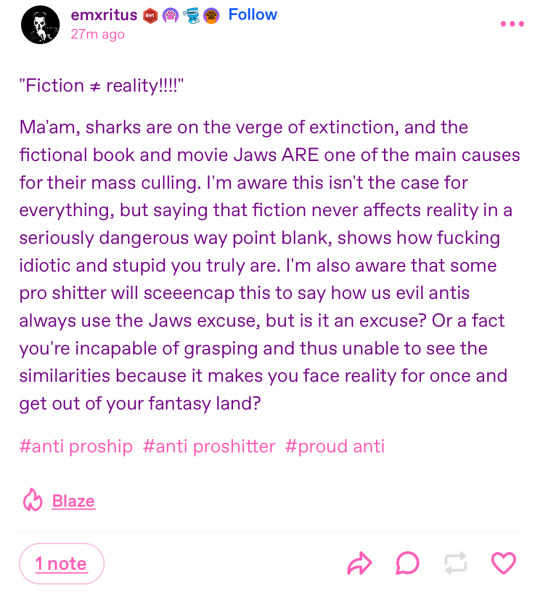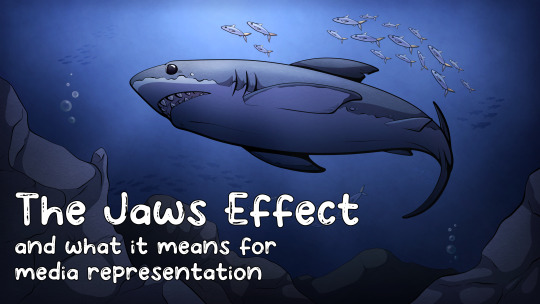#jaws effect
Explore tagged Tumblr posts
Text

Anyway they won’t allow comments OR reblogs (my guess is so they can stay in their echo chamber and so they don’t have to own up to spreading misinformation) so I’m going to debunk this misinformation here on my own post.
Sharks are, in fact, NOT on the verge of extinction, that is clear by a simple Google search. Certain sharks species are ENDANGERED or VULNERABLE which has nothing to do with JAWS and everything to do with the fishing industry. Of course because they are endangered and vulnerable they RISK extinction in the future but they are not 'on the verge' of it.
List of endangered and vulnerable shark species
Sharks, rays, and similar species are killed NOT because of an American movie but because of overfishing of sharks. In certain cultures, shark fin soup is said to be medicinal and provide a wide range of health benefits. Despite no evidence of such being true, certain cultures still fish for sharks for their fins alone. This is deadly because of the way sharks breathe. They need to be in motion in order to breathe and without their fins they slowly suffocate to death.
Source of why sharks are currently endangered
Last, lets finally bring up JAWS and why this argument doesn't prove the point of "fiction can affect reality" in the way they think it does. JAWS causing people to be more afraid of sharks did NOT cause shark-finners and shark overfishing to occur or get worse. The "JAWS effect" doesn't actually exist in any meaningful way beyond people from the USA being more afraid of sharks. JAWS did not have that much of an impact in other parts of the world where shark fishing is common. Of course the movie JAWS DID inevitably lead to people killing sharks, but not nearly to the scale most assume. Shark-fishing tournaments were set up and fishermen at the time would catch as many sharks as they could. This did lead to a big decline of sharks in the US east coast due to the overfishing. Keep in mind that this, however, does not account for the millions of sharks killed for their fins every year.
Did JAWS have an impact on the way people (especially in English-speaking countries) saw sharks? Yes it did, the uneducated masses at the time had no idea how sharks actually functioned. Did JAWS cause a decline in shark populations in the US? Yes it did, fishing contests put in place greatly affected the sharks in the East coast of the US. Did this have a greater impact on shark populations as a whole and their decline? Nope! The biggest reasons sharks are endangered as they are now is because of overfishing, shark finning, and bycatch (catching a fish and then discarding it because it isn't the fish you desired/can sell).
Link 1 about the "JAWS Effect" myth
Link 2 about the "JAWS Effect" myth
#jaws effect#debunk#drama#discourse#proship#anti proship#for reach#y'all need to read this#and focus your efforts#on stopping the real reasons#for shark population decline#worldwide
129 notes
·
View notes
Note
You know I fear for people online when you see takes like “jaws (the movie) contributed to a declining shark population”
I ranted about this before, how a 23 YEAR OLD ADULT made that post and genuinely believed that fiction affected reality this strongly and thousands of people believed it
Today I got a notification that the post got a helpful community note which says “the jaws effect has been debunked and overfishing is generally attributed to a declining shark population”
BUT OF COURSE
NO ONE CARES ABOUT AN OLD MOVIE FROM 1916
...Jaws is that old?
At least somebody finally put the disclaimer that the jaws effect isn't a thing.
#proshippers against censorship#jackal barks#proship please interact#proship positivity#proship#proshipping#proshipper#proshippers please interact#proshipper safe#anti anti#ask#asks#jaws#jaws effect
24 notes
·
View notes
Text


new effects doing crazy things to Pitch
#mouth agape jaw on the floor in awe#effects are the best feature we ever got on this website actually#flight rising
181 notes
·
View notes
Text


we are borgia bastards. and there, dear sis, lies the difference.
#jaw dropped salivating shakes on the floor eyes popping out of head awooga awooga sound effect car horn plays heart beats out of chest etc#this was the perfect opportunity for these two to hatefuck the tension out of each other wait what who said that#it would've bridged that gap between them it's that serious!! that being said hatefucking is a lost art we need it back in tv asap#juan borgia#lucrezia borgia#the borgias#perioddramaedit#perioddramasource#onlyperioddramas#televisongifs#dailyflicks#tvarchive#cinemapix#tvedit#tvgifs#filmtvcentral#dailytvfilmgifs#david oakes#holliday grainger#by jen
210 notes
·
View notes
Text
Just imagining Widogast being in the presence of Fearne and Ashton for longer than 10 minutes and going “ what the absolute flying fuck”
Just, the morally dubious Fire Fey and Dunamantic Earth Genasi shall be his Bisexual Maelstrom 2: Electric Boogaloo, but in the “I want to study you like a very intriguing bug” wizard-type fashion
#anyways I think Caleb awed by the raw combined power of these two#fearne sets herself in fire and Caleb just jaw drop#though tbh she has that effect on everyone#critical role#cr spoilers#sorta
109 notes
·
View notes
Text
Okay, confession time. I have a story that relates embarrassingly well to the Jaws Effect. So, no joke, I spent a mortifyingly long part of my life afraid of robots/AI. Not for the right, scientifically informed reasons, mind you-oh no. As a child, I watched the -admittedly poor movie adaptation of- I, Robot, a movie which involves several scary robots trying to annihilate humanity. Now, I am quite technologically impaired, so the result was that ignorance + scary robot movie experienced at young age= irrational fear that intelligent robots will plot your doom. This meant that when my parents bought a Roomba, and later an Alexa, part of me was very afraid these devices would plot our doom. Specifically, the Alexa would order the Roomba to crush our necks in the middle of the night. (My parents, of course, found this as absurd as you and I currently do). It took personally watching a Roomba fail epically at turning around for me to realize that the Roomba was not, in fact, a good accomplice for Alexa. (And even then, I only thought Alexa would just give up in exasperation). The obvious light did not turn on in my head until at last, with encouragement from family, I took a computer course in college. And it was then that I finally realized: computers are not, in fact, super intelligent. Computers are, in fact, a pile of glorified rocks and metal animated by lightning. They are not smart enough to have feelings; that is orders of magnitude above their capabilities. Self-driving cars and the like are just machines run by glorified computer programs. I bet the lot of you are either laughing hysterically or shaking your head in disbelief. Or, if you're really tech-savvy you're screaming in frustration. But think about this: you're doing that because you have the tech-savviness to know better. Thus, you disregard what you see in I, Robot (especially if you've read the book) and rely on your own knowledge instead. A person who doesn't have that knowledge can't disregard what they see in the media. What they see in the media is all they have to go on. So yeah, media representation has a huge effect on people. Why do you think both historical (and current) despots have such huge propaganda machines? Because they work. This is why it is crucial that media representation of marginalized groups is both positive and accurate. Why creators should do research to make sure their portrayals are as truthful as possible. But a more positive side note, my story also highlights that corrections and pressure on the ignorant to educate themselves does bring about results.
The Jaws Effect and what it means for media representation

The Jaws Effect is the name of a phenomenon that described the panic and fear that sprang up around sharks, fuelled by Steven Spielberg's movie, Jaws. While the fear of sharks and other marine predators had always been a thing, Jaws launched the fear of sharks, and Great White Sharks in particular, to new (and mostly unfounded) heights. Most people will never encounter a real-life shark and so their only knowledge about the creatures come from movies and other forms of entertainment. Entertainment that largely portrayed them as mindless, unfeeling killing machines. After Jaws, sharks became a staple in the creature-feature genre of movies, which only perpetuated the idea of sharks as dangerous monsters even further, reigniting and reconfirming the beliefs the public held about them in the process. These ideas about sharks are, of course, not true, but the misconception and fear has had a real, observable impacts on shark populations, shark conservation efforts and even laws and legislations surrounding sharks and shark conservation around the world.
Ok but Cy, this is a blog about disability and disabled representation, what do sharks have to do with anything you talk about? Well, Because The Jaws Effect is just one of many examples that shows how massive of an impact representation in the media can have, for better or for worse, especially when talking about subjects the public generally knows very little about.
This conversation is not unique to disability representation, nearly every person I've seen who's talked about how to write and design characters from any minority brings it up eventually, but the media we consume, the movies we watch, the books we read can all have big impacts on people's perceptions on those topics. When talking about disability specifically, it's an unfortunate reality that not many people know all that much about us, and so, much like sharks, for many, their only real exposure to disabled people is through the media they consume.
If you don't know anyone in a wheelchair, and your only knowledge of life as a wheelchair user comes from books and movies like Me Before You, of course you're going to (spoiler) come away thinking that life in a wheelchair is horrible and death is better than living like that. If you don't know any DID Systems and your only exposure to a condition like that is through movies like Split (and honestly, a number of other horror movies and crime shows) of course you'll think people with DID are unstable monsters who could become violent any moment. If your only exposure to autistic people is Music, then it's not shocking that you might think Autistic people are "trapped in their own minds," completely unaware of the world around them and lacking any kind of agency. As much as I'd like to be able to say these are "just movies" or "just books," and that if we don't like them, we can just not watch them, they all had an impact on the real world and real people's perceptions of the disabilities they depicted, as do the many, many smaller examples of bad representation.
This is why I personally spend so much time focused on the portrayal of disability in the media, why so much of my content is focused on creating resources for creators to represent us better, and why I think writers, artists and other types of creators should care about the representation they include.
Unfortunately, people believing misinformation and stereotypes, while annoying, isn't the worst of the impacts bad rep can have. If a stereotype is prevalent enough, and enough people believe it, it can both put us in harms way and cause us to loose access to things we desperately need and things designed to help us. One really common example of this is when movies and TV shows show a character getting up out of their wheelchair, and use this as proof that the person is faking being disabled. However, in reality, there are many disabilities that might mean someone has to use a wheelchair, even if they can still walk a little bit or stand up. The stereotype of someone standing up from their chair being a fake, especially when it's reinforced over and over again in the media, leads non-disabled people to believe that anyone who stands up from their wheelchair is faking, and results in a lot of real disabled people being harassed and denied things like access to disabled parking, toilets and other accessible spaces. There were even a few cases of people reporting those they see get out of their wheelchairs to Centrelink (The Australian "welfare" department, for those not familiar) as frauds, and while these investigations don't usually go far before someone realises what's happened, it has, on occasion, resulted in people loosing the income they depend on to survive, even temporarily.
But the impact of representation, of course, can go both ways.
I was in high school when the first How To Train Your Dragon movie came out, and at the time, I didn't really like people being able to see that I was a leg amputee because I was sick of kids in particular staring, pointing at me, asking their parents "what's wrong with them?" or asking me directly, "what's wrong with your legs?". I wore long skirts and big, bulky tracksuit pants to keep my legs covered, something that became dangerous in the hot Australian summer, but I didn't care.
But the impact of How to Train Your Dragon came in two ways. The first, was that it was one of the first times I'd seen an amputee (or rather, multiple amputees) who didn't keep their prosthetics covered or hidden, and it gave me the little boost in confidence I needed to do that myself and wear clothing that was more comfortable and functional. And second, the comments from children changed, albeit slightly, but enough that it was noticeable. The questions and comments went from "what's wrong with you?" to "oh cool, your legs are like Hiccup's!" I even had one little girl ask me once if I had a pet night fury. They went from being scared of me and my legs, or at the very least concerned for me, to genuinely curious and impressed. While reactions like that did become less and less common over time, they didn't fully go away either. Even today, I occasionally get young kids asking me why I have legs like hiccup. A friend of mine who was born with one arm shorter than the other and without fingers on that side had a similar experience with the movie Finding Nemo. Her disability was a bit more complex than what I described here, and she always found it hard to explain "what happened" to small children, however, after Finding Nemo came out, she was able to simply tell kids "this is my lucky fin, like what nemo has!" and that was enough to take her from someone "scary" to these kids to someone like their favourite characters.
Of course, it's much easier to see the impact positive representation can have on people's perceptions when we're talking about kids media, but it's not exclusive to it either.
When it comes to a minority like the disabled community who are so thoroughly misunderstood by the wider public, misinformation can and does spread easily. What people see and read in the media they consume plays a big roll in how people perceive the real people attached to the stereotypes. We often hear people say "Fiction imitates life" but the reverse can and often is also true, life can imitate and be influenced by fiction, and those of us creating should be mindful of this, especially when we're talking about a group of vulnerable people.
[Thumbnail ID: An illustration of a Great White Shark swimming near the rocky bottom of the ocean, surrounded by silver fish. In the bottom left corner of the image is "The Jaws Effect and what it means for media representation" in big, white bubble text. /End ID]
1K notes
·
View notes
Text
wait arin and morro are parallels. both were given unrealistic expectations by their teachers that ultimately led to them feeling like failures, and so they became bitter towards their teachers and felt the need to prove themselves, ultimately ending in a betrayal and manipulation by a powerful being from another realm... ninjago dragons rising writers what did they put in your water to make you cook...
#ninjago dragons rising#ninjago dr s3#arin nived#arin ninjago#morro wu#ninjago morro#text post#when arin ran into morro my jaw dropped.#never did I expect another morro appearance to be pulled off effectively#but MAN they made it work#dragons rising writing is so awesome like.#dont get me wrong there are some fumbles (side eyeing Zane)#but the overall character work and multiseason plots and fight scenes#they are COOOKING!!!
25 notes
·
View notes
Text
The Mandela Effect In Movies
There are so many quotable lines from movies but we as people often apply phrases to movies or shows that were never said, of we remember them differently said and run with that. The top of my list is, "My God, it's full of stars." A few days ago my buddy was looking at the oil we had just drained out of a tiller motor. He sloshed it around the bowl like he was looking for gold and upon seeing all the metal shavings in the oil he said "My God, it's full of stars." I said where did you hear that? And he said it was from the movie '2001: A Space Odyssey'. (1968) I asked him if he had ever read the book he said "No, why?" I said because that line is only in the book and not the movie. He insisted it was from the move. The line would not be heard until the movie '2010: The Year We Make Contact' (1984). Other examples of this Mandela Effect in movies are are:
The Empire Strikes Back (1980) What we think was said: “Luke, I am your father,” What was really said: “No, I am your father.” The Wizard Of Oz (1939)
What we think was said: “I don’t think we’re in Kansas anymore,” What was really said: “Toto, I’ve a feeling we’re not in Kansas anymore.”
Field Of Dreams (1989) What we think was said: “If you build it, they will come.” What was really said: "If you build it he will come." Apocalypse Now (1979)
What we think was said: “I love the smell of napalm in the morning. It smells like victory.” What was really said: "I love the smell of napalm in the morning. You know, one time we had a hill bombed for 12 hours. When it was all over, I walked up. We didn't find one of 'em, not one stinkin' dink body. The smell, you know that gasoline smell, the whole hill. Smelled like victory." Jaws (1975)
What we think was said: “We're gonna need a bigger boat.” What was really said: "You're gonna need a bigger boat." Star Trek (The entirety of all iterations of Star trek, involving William Shatner.) (1966-1994) What we think was said: “Beam me up, Scotty.” What was really said: “Scotty, beam us up.”
#2001 a space odyssey#2010 the year we make contact#the empire strikes back#the wizard of oz#field of dreams#apocalypse now#jaws#star trek#mandela effect#misquotes
26 notes
·
View notes
Text
Someone gifted me permanent VIP in Roblox Dress to Impress and to simply say I’m flustered would be a major understatement.
#gifting it to a person who hasn’t even learned how to properly layer clothes and do blood effects?!!!#jaw dropping#I’m very grateful because it’s just a casual game I started playing only a week ago#ttpoilog#hhhhh I think it’s sweet that DTI players are very nice in general
51 notes
·
View notes
Text
Been thinking about the political shitstorm facing Rook after the events of Veilguard. Like, their access to Solas' eluvians would be enough to draw anyone's attention (the crossroads where you can travel across thedas in minutes?? could revolutionize trade. or you know, send an army to your enemies doorstep in a day)
But on top of that? In the span of a a few months(?) They "start" and end the Blight to End All Blights, kill the last two archdemons and two literal gods, AND they stop the Veil from getting torn down.
They've assembled a team of highly skilled individuals with connections to some of the most powerful organizations in Northern Thedas including but not limited to:
The mourn watch who have been playing Weekend at Bernie's with the King of Nevarra for however long and have deep and secret knowledge of the Fade
The remnants of the Grey Wardens who are renowned across all of Thedas
The Archon of the Tevinter Imperium and The Black Divine???
Not to mention they've got an ally in the Inquisitor who -- regardless of whether or not the inquisition is disbanded -- is still a well known and influential figure.
The Veilguard itself may not be a large group like the Inquisition was, but you don't do what Rook did and not gain some notoriety. I'm imagining Rook gets like a week -- two weeks tops -- after sending Solas back to fade jail before the letters start rolling in from all over. Invitations to meet with nobles trying to curry their favor, bargains from merchants, none too few death threats.
Just, the guy is going to be BUSY
#dragon age#datv#datv spoilers#i maybe got a little toasted#and have been pacing my home like a madman thinking about this#had to put thoughts to paper before i exploded#sorry rook but youre a Hero now#and we all know how that works out#whats that one quote from jaws of hakkon?#the one from Ameridan to Inky?#take these moments of happiness when you can. the world will take the rest#or something to that effect#anyway seems applicable in this scenario#why do i keep giving my rook more shit to deal with
21 notes
·
View notes
Text
so i'm reading a scifi book about a guy that got part of his face blown off (one guess why i got it in the first place lmao) and a big muscly redheaded woman just appeared. mr author sir have you perchance played mass effect
#mass effect#garrus vakarian#shakarian#the face injury is to his lower jaw like he has zero lower jaw without a prosthetic but STILL#idk if there's going to be any romance but we shall see#but the redhead is apparently 'young' and the main dude is implied to be not (but it's complicated) so. maybe not them
150 notes
·
View notes
Text
THIS WAS NOT THE FUCKING COMMENT I WAS EXPECTING TO GET ON MY POST HELLO?? 💀💀💀

#LITERALLY GAGGED.#LITERALLY LOCK JAWED.#WTF IS THIS IM CRYING???#this is the funniest bot ever omg...#AND IF THIS ISNT A BOT (which is not likely at all) THEN THIS SHIT IS EVEN FUNNIER 😭😭#i got april foolsed myself bro what the fuck- 😭#damn yall like sophrosyne THAT much huh 💀 /j /nsrs#*vine boom sound effect goes off*#watch rosyne brag to starry abt that and how ppl like her more and starry's just like “im so glad that DIDNT happen to me..” XD /j /nsrs#actually crying though what is this..#not maintagging this at all i hope this gets buried 💀#i just thought it was funny asf to post-#also dont forget to get any last questions in for rosyne as i probably wont be able to respond to them after a few more hours!
11 notes
·
View notes
Text
It should be forbidden to be a little bit hurt all over the place
#Status effects: sleepy. Muscle pain in one leg. Damaged jaw joint. Cramps. Same foot also has an annoying ass sore#And as of rn also hungry somehow this is illegal with cramps. Wdym I'm either hungry or dying badly#And overheating bc ofc I am
11 notes
·
View notes
Text


HOLLIDAY GRAINGER "Mickey 17" World Premiere at Cineworld Leicester Square on February 13, 2025 in London, England.
#the pics keep dropping likeeee#jaw dropped salivating heart shaped eyes popping out of head awooga awooga sound effect car horn plays heart beats out of chest#holliday grainger#hollidaygraingeredit#dailywomen#flawlessbeautyqueens#flawlesscelebs#femaledaily#femalestunning#glamoroussource#cinemapix#dailywomansource#mickey 17#by jen
105 notes
·
View notes
Text


Next person who is rude to me is getting swallowed alive
7 notes
·
View notes
Text
but would bear spray have worked on tuunbaq? im inclined to say no (it’s huge and also not strictly an animal) but i think it’d be really funny if they had it anyway
everybody still dies in horrible ways but with the added comedy of increasingly elaborate bear spray mishaps
#lots of accidental self-macing#instructions unclear the ABs thought it was an area of effect citronella candle situation and maced the whole carnivale#bryant refuses to carry it bc its not masc enough. everybody knows the best way to deter a charging bear is to shoot at it blindly.#he still gets his skull disconnected from his lower jaw#tuunbaq cant understand why these guys r suddenly so spicy#tuunbaq eats franklins cannister when it rips off his leg and just has mild indigestion#first lieutenant littles can just explodes in the extreme temps and hes blind for a week#ive been (very peripherally) bear sprayed before and ill tell u. edward little moment#tuunbaq#the terror
10 notes
·
View notes